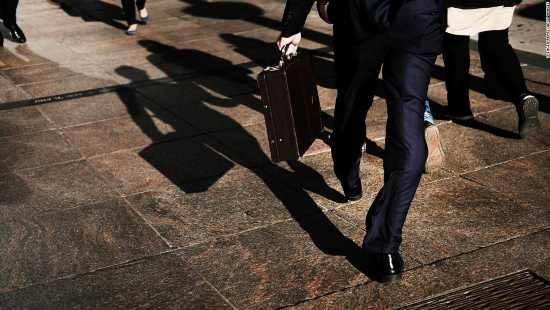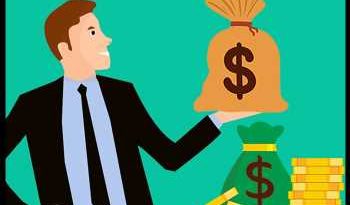Business professor says that Elon Musk is on the hook for $45 billion
This story is part of CNN Business’ Nightcap newsletter. To get it in your inbox, sign up for free, here.
New York (CNN Business)
‘GREEDFLATION’
Stop me if you’ve heard this one before: The rich are getting richer and the rest of us are getting poorer. (Shocking, I know.)
But a new report from the top American union group is shedding light on just how much better off the bosses in the C-Suite are versus their employees.
The upshot:
- S&P 500 CEOs on average got a roughly 18% bump in compensation, averaging $18.3 million in 2021, according to the new AFL-CIO Executive Paywatch Report. That’s 324 times the median worker’s pay at those companies. (In 2020, that ratio was 299-to-1. And in 2019, it was 264-to-1.)
- It doesn’t take a mathematician to figure out that’s way more than keeping up with inflation, which clocked in at 7.1% for the year.
- Rank-and-file employees broadly saw wages go up about 4.7% in 2021. That’d be a solid raise in a normal year, but not when prices are climbing at their fastest clip in four decades. When adjusted for inflation, real wages among workers actually fell 2.4%.
The rapid rise in CEO pay is a symptom of what the researchers call “greedflation,” which occurs when companies raise prices to boost profits, which in turn juices their stock prices and generates “windfall payouts” for CEOs.
The report specifically called out Amazon for having the highest CEO-to-worker pay ratio in the S&P 500 Index: a staggering 6,474 to 1.
“Instead of investing in their workforces by raising wages and keeping the prices of their goods and services in check, their solution is to reap record profits from rising prices and cause a recession that will put working people out of our jobs,” said Fred Redmond, Secretary-Treasurer of the AFL-CIO, in a statement.
Amazon’s new CEO Andy Jassy, who took over from Jeff Bezos just over a year ago, received $212.7 million in total compensation, which includes salary, stock options and bonuses. (The median pay among Amazon workers, meanwhile, was just $32,855 in 2021. The company also jacked up the cost of its Prime membership by nearly 17% earlier this year and introduced new fees for Whole Foods deliveries.)
An Amazon spokesperson chalked the extreme pay gap up to financial reporting rules. “We are required to report that grant as total compensation for 2021, when in reality it will vest over the next 10 years,” the spokesperson told my colleague Vanessa Yurkevich.” What this equates to from an annual compensation perspective is competitive with that of CEOs at other large companies and was approved by the Amazon Board of Directors.”
The highest-paid CEO in the report was Peter Kern of Expedia, who raked in $296.2 million — a measly 2,897 times more than the median Expedia worker. A spokesperson declined to comment on the report but noted Kern earns a base salary of $1 million a year, with 1 million restricted stock units that are vesting over three years.
“Long-term equity incentive awards account for approximately 99% [of] Peter’s 2021 compensation,” said an Expedia spokesperson.
BOTTOM LINE
Many forces contribute to inflation, including supply chain bottlenecks, climate change, federal monetary policies, geopolitical turmoil, and, yes, greedy corporations.
But at the core of the “greedflation” argument is the idea that some big companies are taking advantage of this inflationary moment to jack up prices and/or reduce the amount of stuff you’re getting (the latter scourge is called “shrinkflation,” which is a cute-sy way of saying you the customer are getting absolutely hosed by mega-corporations and you have no way around it because of a decades of market consolidation reducing competition that would, in a fair system, discourage such practices…but I digress).
Is greed the only culprit behind inflation? Far from it. Is it among the more nefarious/shameful? 100%.
It’s not just the optics that are bad. Experts say it’s also legitimately bad for business. At a time when companies all over are complaining about staffing shortages and unionization efforts — why not try to stand out as the one that’s making peace with workers and narrowing that gap?
— CNN’s Vanessa Yurkevich contributed reporting.
NUMBER OF THE DAY: $23,000
The crypto faithful have seen it coming: Bitcoin, following a bruising selloff, is up more than 15% in the past week. Buuuut smart people who invest for a living remain cautious, my colleague Paul R. La Monica writes. Now hovering around $23,000, the price of a single bitcoin has plunged more than 65% below last year’s all-time high of nearly $70,000.
Key quote: “We will see a longer-term rally in the digital assets sector, but I wouldn’t get too excited yet,” said Joel Kruger, market strategist at LMAX Group. “This is still an emerging market.”
TWITTER SAGA
Twitter came out swinging in its legal tussle with its would-be owner Elon Musk.
Here’s the deal: On Tuesday, a judge gave Twitter an early victory, ruling that the case should be fast-tracked in a five-day trial this fall. (ICYMI, Musk is trying to wiggle his way out of the $44 billion takeover offer he made for Twitter back in April, and Twitter is suing to compel him to complete the deal.)
Tuesday’s ruling is a big deal for a few reasons. Let’s step back:
- When it filed the lawsuit against Musk last week, Twitter’s legal team argued for a speedy trial, saying the uncertainty around the deal and pending litigation harms the company “every hour and every day.” In other words: Twitter’s shareholders are left in limbo, and that’s not fair to them.
- Lead counsel William Savitt also pointed out how Musk has continued to disparage Twitter on — where else? — Twitter.
- Musk’s lawyer countered, noting that the billionaire remains one of Twitter’s largest shareholders and therefore has no incentive to drag the trial out. But Musk has said he needs more time to investigate what he sees as a dealbreaker — the presence of spam and fake accounts on Twitter.
- Musk is raising a big stink about spam accounts, but most people who are following this truly bizarre corporate drama agree the bot issue is little more than a pretext for Musk to renege on the deal, which wildly overvalued Twitter at 54.20 a share. (Musk’s lawyer dismissed that claim as “nonsense” on Tuesday).
BOTTOM LINE
Although Tuesday’s hearing was largely procedural, my colleague Clare Duffy writes, it offered a look at how each side may approach what is likely to be a messy litigation process. It also give us a peek at how the judge is framing the dispute.
Musk’s team had asked for a February 2023 trial, giving them seven months to prepare. But the judge, Chancellor Kathaleen St. Jude McCormick, said such a delay “underestimates the ability of this court … to quickly process complex litigation.”
“The reality is that delay threatens irreparable harm [to Twitter] … the longer the delay, the greater the risk,” McCormick said during the hearing, which was conducted remotely after she tested positive for Covid.
I mean, what what would this twisted Twitter saga be without some extra Covid complexities piled on?
Enjoying Nightcap? Sign up and you’ll get all of this, plus some other funny stuff we liked on the internet, in your inbox every night. (OK, most nights — we believe in a four-day week around here.)
Source: Read Full Article


